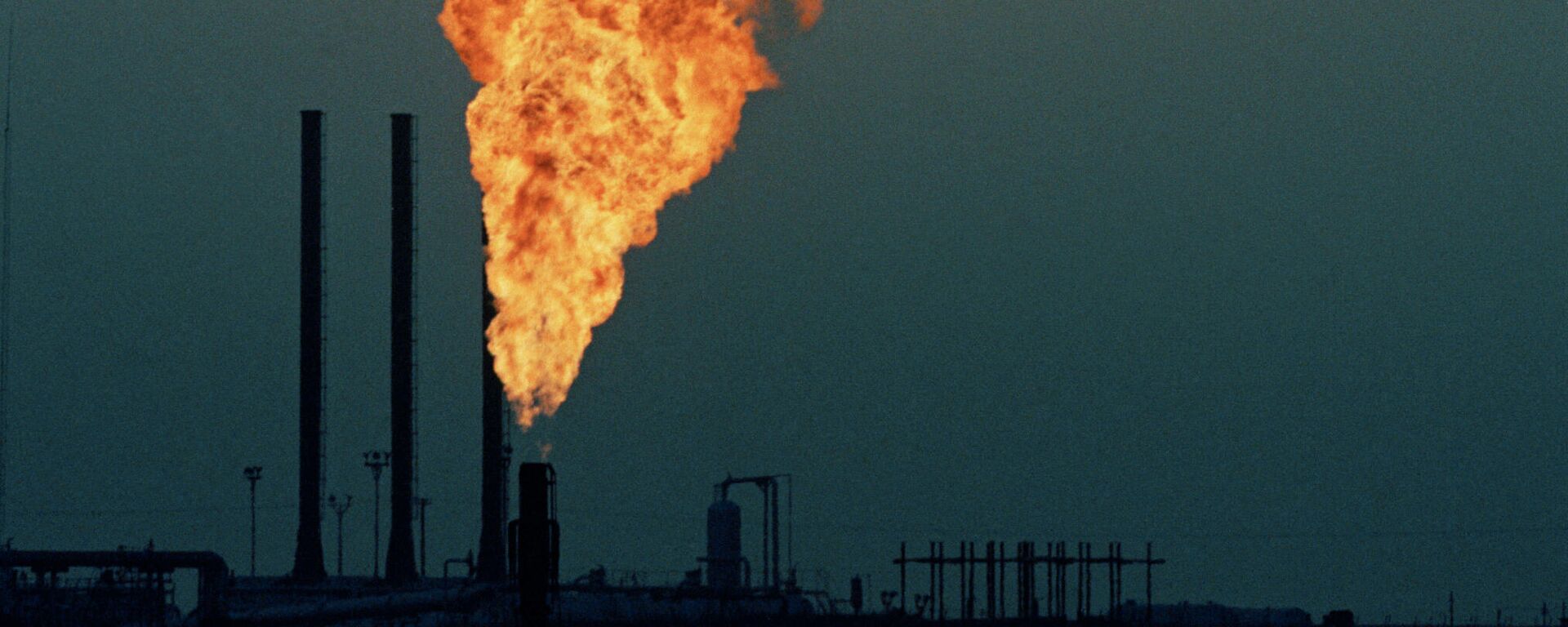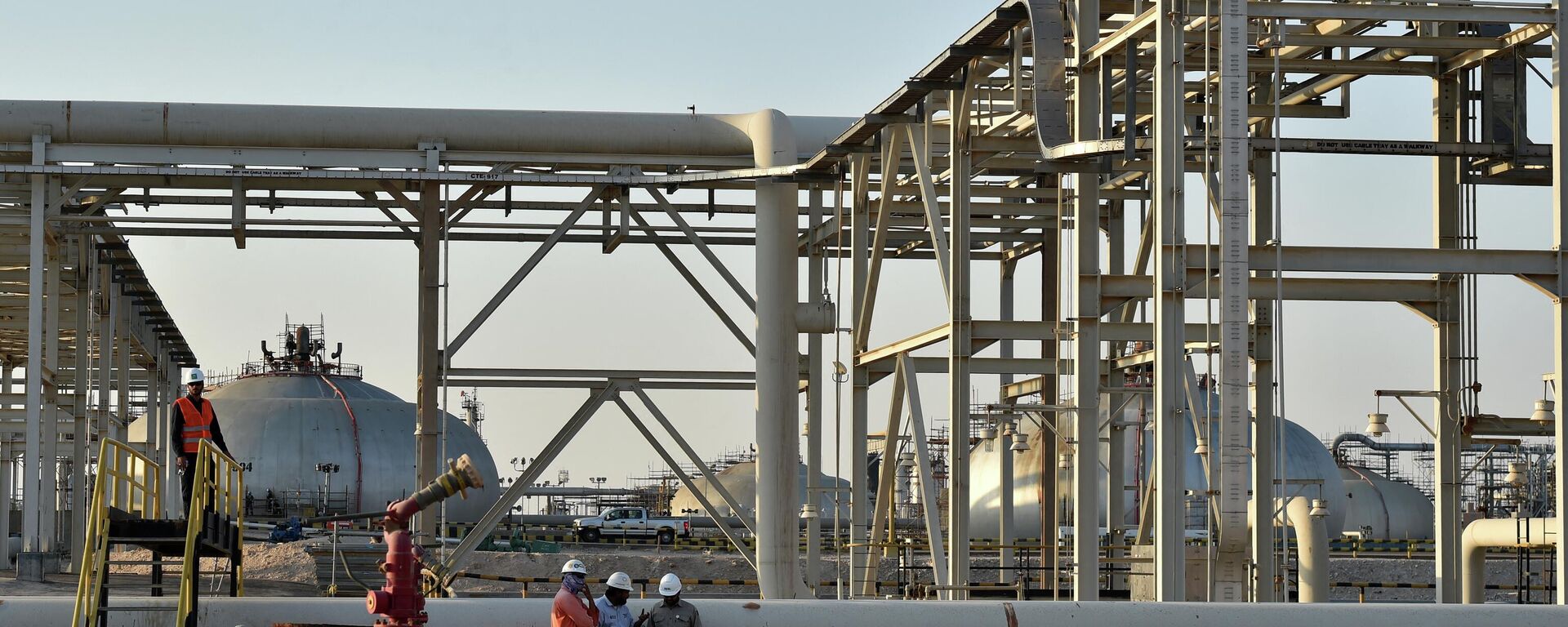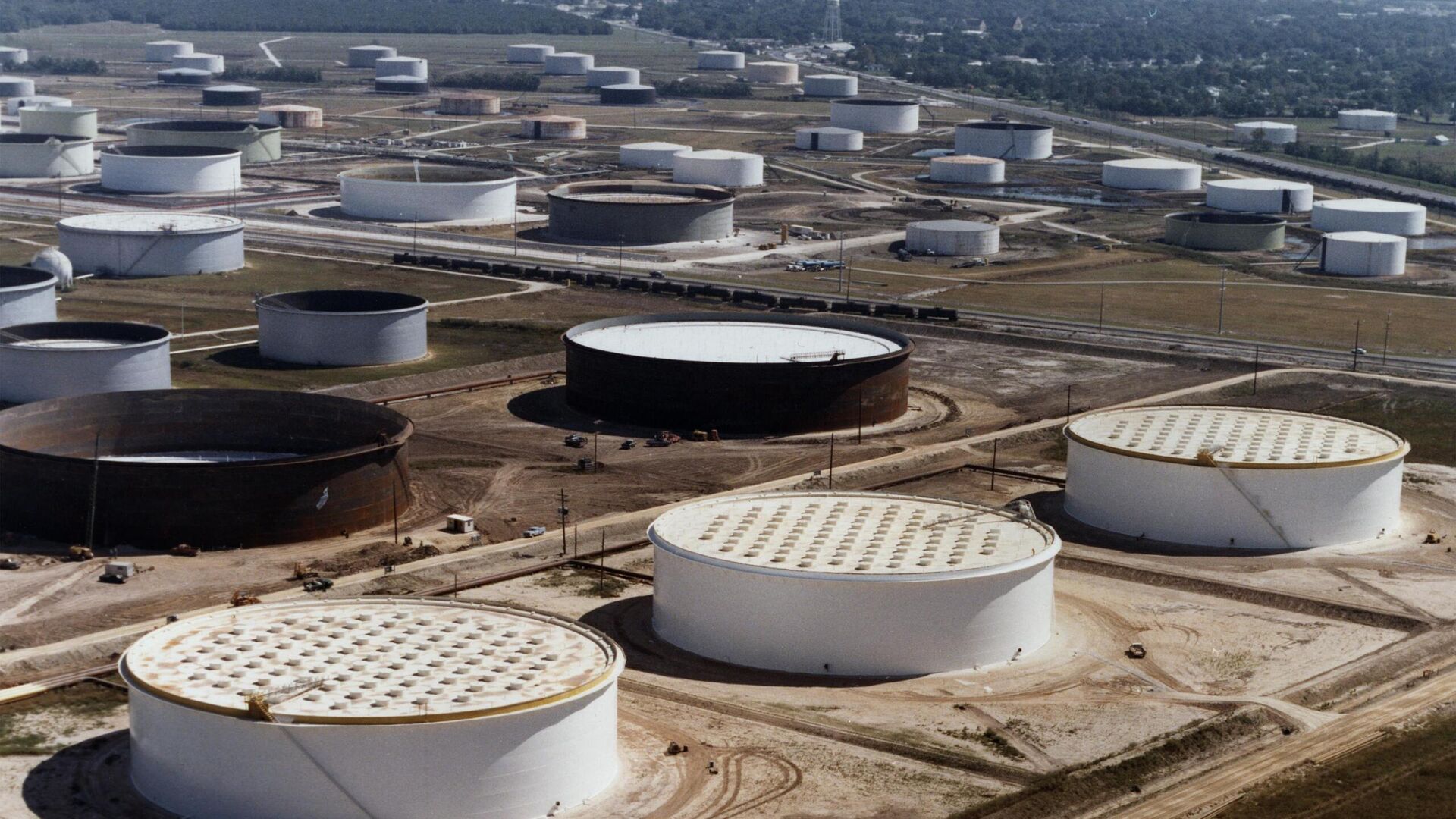https://sputnikglobe.com/20220815/oil-prices-hit-65-month-low-on-tumbling-china-demand-iran-saudi-supply-twist-1099631309.html
Oil Prices Hit 6.5 Month Low on Tumbling China Demand, Iran-Saudi Supply Twist
Oil Prices Hit 6.5 Month Low on Tumbling China Demand, Iran-Saudi Supply Twist
Sputnik International
NEW YORK (Sputnik) - Crude prices hit six-and-a-half month lows on Monday after leading importer China released bearish July data for oil while the country's... 15.08.2022, Sputnik International
2022-08-15T21:00+0000
2022-08-15T21:00+0000
2022-08-15T21:00+0000
world
oil prices
opec
crude oil
aramco
https://cdn1.img.sputnikglobe.com/img/07e6/03/1f/1094365039_0:0:2560:1441_1920x0_80_0_0_9934dd6454a7bc5ca60f04a72090eec6.jpg
West Texas Intermediate (WTI), the benchmark for US crude, settled down $2.68, or 2.9%, at $89.41. It plunged more than $5 earlier to $86.86, the lowest level since January.Brent, the London-traded global benchmark for crude, settled down $3.05, or 3.1%, at $95.10. It hit earlier a session low of $92.80.China's oil refinery output slipped to 12.53 million barrels daily, its lowest since March 2020, government data showed.The ING Bank cut to 4% its forecast for China's 2022 gross domestic product growth, down from a previous projection of 4.4%, and said a further downgrade was possible as factory, retail activity and property market growth all fell in July.On the supply side, Iran had until midnight on Monday to respond to the European Union's final draft text to save the 2015 nuclear agreement.Oil supplies could rise if Iran and the United States return to their arrangement from seven years ago to allow Tehran to export oil on the condition that it was not making a nuclear weapon.Iran, which has indicated a willingness to work with the European Union on the matter, also called on the United States to show flexibility to resolve three remaining issues that stood in the way of reaching a deal.The head of Saudi Aramco, the world's top oil exporter, meanwhile, said it was ready to ramp up output despite signs of a slowing global economy.Aramco’s pivot on production came just after the Saudi-led Organization of the Petroleum Exporting Countries (OPEC) suggested a weakening in oil demand by the end of the year.OPEC pumped 26.72 million barrels per day in July, up 610,000 from June's revised estimate, according to a media poll. OPEC output has risen every month since June 2020 apart from February.Some analysts said they were surprised when on Friday OPEC revised down its daily oil demand expectations for 2022 by 260,000 barrels. OPEC has typically used lower demand as an excuse to cut production and boost prices.The downgraded OPEC forecast came on the same day that the International Energy Agency said soaring international prices for natural gas could prompt more energy consumers to switch to oil for year-end heating purposes.But Aramco’s seemingly altered stance on Saudi production now startled more than a few people as the state-owned company rarely makes such a commitment without clearance from Energy Minister Abdulaziz bin Salman or his half-brother, the Crown Prince Mohammed bin Salman.In the United States, the peak summer driving season is winding down and fuel demand is expected to decrease further in the next two weeks after parents drop their children back to school and college for the new academic year beginning in September.
https://sputnikglobe.com/20220815/western-sanctions-may-hamper-russian-iranian-offshore-gas-production-plans---rystad-1099630029.html
https://sputnikglobe.com/20220814/saudi-aramcos-net-income-rises-to-record-879bln-in-first-half-of-2022-1099572139.html
Sputnik International
feedback@sputniknews.com
+74956456601
MIA „Rosiya Segodnya“
2022
Sputnik International
feedback@sputniknews.com
+74956456601
MIA „Rosiya Segodnya“
News
en_EN
Sputnik International
feedback@sputniknews.com
+74956456601
MIA „Rosiya Segodnya“
Sputnik International
feedback@sputniknews.com
+74956456601
MIA „Rosiya Segodnya“
oil prices, opec, crude oil, aramco
oil prices, opec, crude oil, aramco
Oil Prices Hit 6.5 Month Low on Tumbling China Demand, Iran-Saudi Supply Twist
NEW YORK (Sputnik) - Crude prices hit six-and-a-half month lows on Monday after leading importer China released bearish July data for oil while the country's central bank cut lending rates to revive demand in an economy clearly hurting from Beijing's continued coronavirus clampdowns.
West Texas Intermediate (WTI), the benchmark for US crude, settled down $2.68, or 2.9%, at $89.41. It plunged more than $5 earlier to $86.86, the lowest level since January.
Brent, the London-traded global benchmark for crude, settled down $3.05, or 3.1%, at $95.10. It hit earlier a session low of $92.80.
China's oil refinery output slipped to 12.53 million barrels daily, its lowest since March 2020, government data showed.
The ING Bank cut to 4% its forecast for China's 2022 gross domestic product growth, down from a previous projection of 4.4%, and said a further downgrade was possible as factory, retail activity and property market growth all fell in July.

15 August 2022, 19:50 GMT
On the supply side, Iran had until midnight on Monday to respond to the European Union's final draft text to save the 2015 nuclear agreement.
Oil supplies could rise if Iran and the United States return to their arrangement from seven years ago to allow Tehran to export oil on the condition that it was not making a nuclear weapon.
Iran, which has indicated a willingness to work with the European Union on the matter, also called on the United States to show flexibility to resolve three remaining issues that stood in the way of reaching a deal.
The head of Saudi Aramco, the world's top oil exporter, meanwhile, said it was ready to ramp up output despite signs of a slowing global economy.
"We are confident of our ability to ramp up to 12 million bpd any time there is a need or a call from the government or from the ministry of energy to increase our production, " Aramco’s CEO Amin Nasser said.
Aramco’s pivot on production came just after the Saudi-led Organization of the Petroleum Exporting Countries (OPEC) suggested a weakening in oil demand by the end of the year.

14 August 2022, 09:38 GMT
OPEC pumped 26.72 million barrels per day in July, up 610,000 from June's revised estimate, according to a media poll. OPEC output has risen every month since June 2020 apart from February.
Some analysts said they were surprised when on Friday OPEC revised down its daily oil demand expectations for 2022 by 260,000 barrels. OPEC has typically used lower demand as an excuse to cut production and boost prices.
The downgraded OPEC forecast came on the same day that the International Energy Agency said soaring international prices for natural gas could prompt more energy consumers to switch to oil for year-end heating purposes.
But Aramco’s seemingly altered stance on Saudi production now startled more than a few people as the state-owned company rarely makes such a commitment without clearance from Energy Minister Abdulaziz bin Salman or his half-brother, the Crown Prince Mohammed bin Salman.
"The Chinese economy is pointing lower, US crude production is rising and leading economies all have problem patches that look set to worsen. And Aramco’s hinting at higher production?" John Kilduff, founding partner at New York energy hedge fund Again Capital, said.
In the United States, the peak summer driving season is winding down and fuel demand is expected to decrease further in the next two weeks after parents drop their children back to school and college for the new academic year beginning in September.






